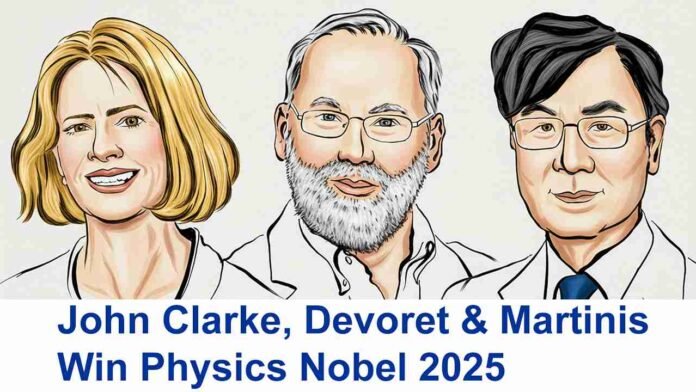Trio Wins Physics Nobel 2025 for Quantum Tunnelling Breakthrough
The 2025 Nobel Prize in Physics has been awarded to scientists John Clarke, Michel Devoret, and John Martinis for their pioneering work on quantum tunnelling. Their research revealed how particles can pass through barriers once thought impenetrable, offering new insights into the mysterious world of quantum mechanics. The Royal Swedish Academy of Sciences recognized their work as a cornerstone for future quantum technologies.
Revealing the Power of Quantum Circuits
The trio created a groundbreaking electrical circuit using two superconductors separated by a thin non-conducting layer known as a Josephson junction. This setup demonstrated how particles can act as a unified entity, exhibiting tunnelling even without voltage. Their experiment not only confirmed macroscopic quantum behaviour but also opened pathways toward quantum computing and ultra-sensitive quantum sensors.
Laying the Foundation for Quantum Computing
Just as early quantum theories led to transistors and silicon chips, this discovery has paved the way for superconducting circuits capable of powering quantum computers. Unlike classical computers that use bits, quantum computers use qubits, performing complex calculations exponentially faster. These advances could revolutionize data encryption, computing power, and national programs such as India’s Quantum Mission 2031.
A 40-Year Legacy in Quantum Physics
Physicist Arindam Ghosh from the Indian Institute of Science hailed the discovery as a “pillar of today’s understanding” in superconducting qubits. Conducted nearly 40 years ago, this fundamental research continues to shape modern quantum engineering. By showcasing the power of Josephson junctions, Clarke, Devoret, and Martinis transformed what was once pure theory into real-world quantum innovation.
The Scientists Behind the Discovery
John Clarke, a professor at UC Berkeley since 1968, led the group specializing in superconductivity and quantum circuits. Michel Devoret, after earning his PhD in Paris, joined Clarke’s lab, where he met John Martinis, then a doctoral student. Together, they meticulously shielded their setup from interference, achieving unprecedented precision in quantum measurement. Their efforts now earn them an 11 million Swedish kronor (₹1 crore) Nobel Prize.
Celebrating a Century of Quantum Innovation
Olle Eriksson, Chair of the Nobel Committee for Physics, praised the trio’s discovery, saying it reflects how century-old quantum mechanics still drives innovation. From semiconductors to digital computing, quantum science continues to surprise and inspire. This Nobel recognition underscores how curiosity-driven research can shape the technology of tomorrow.
Trump Clashes With Netanyahu Again Over Gaza Peace Deal

